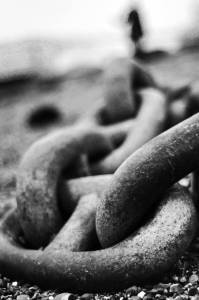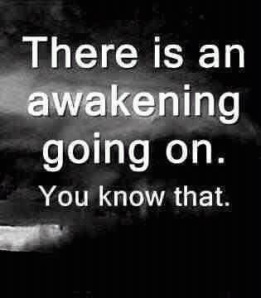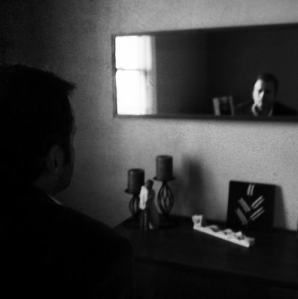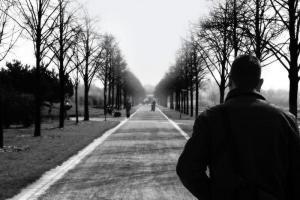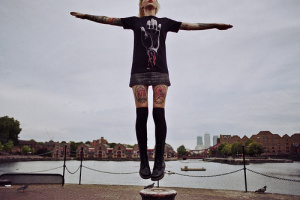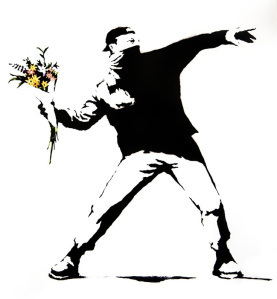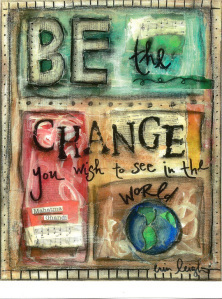Jim Palmer's Blog, page 35
March 27, 2014
Is institutional Christianity the Stockholm Syndrome?
Stockholm syndrome, or capture-bonding, is a psychological phenomenon in which hostages express empathy and sympathy and have positive feelings toward their captors, sometimes to the point of defending and identifying with them. Has institutional Christianity become this?
“Faced by someone promising to do them harm if they didn’t do as they say, most people would at least regard such a person as the enemy. Institutional Christianity, however, embraces this “person” as God. They praise and adore him, and even worship this God who has promised them eternal suffering if they don’t do as he says. They bow their heads in thanks, praising him for giving them a way out of the trap he has set for them.
Some expressions of religion bring Stockholm Syndrome to mind.
In the case of religion, God is the one in control of all things good or bad, including all human beings that he created. God is presented as perfect, righteous and holy, while human beings are characterized as bad, sinful, unworthy, disgusting, and deserving of God’s condemnation, punishment, and wrath. This feeds the belief that every second without punishment is an act of love from God.
This comparison plays out further in the notion that one either does as God says or they suffer the consequences. What hangs in the balance is God’s blessing, and ultimately which afterlife one gets, Heaven or Hell. Heaven is for those who do as God says, and Hell for those who don’t comply.
Wanting to avoid Hell and garner a place in heaven, Christians abide by God’s demands, which include admitting your worthlessness, signing off on a particular theology about God, and following the commands and expectations of God, depending on the particular denomination or church.
So in essence, you have an agent, God, who has set up a hostage situation (denial of blessing, and impending doom) and the conditions by which one can escape (upholding certain beliefs, obeying God, following the prescribed religious program).
Faced by someone promising to do them harm if they didn’t do as they say, most people would at least regard such a person as the enemy. Christians, however, embrace this “person” as God. They praise and adore him, and even worship this God who has promised them eternal suffering if they don’t do as he says. They bow their heads in thanks, praising him for giving them a way out of the trap he has set for them. They even defend his honor and greatness: none greater or better, or more loving than this God. Never mind that he admittedly created evil, threatens, is jealous and possessive, misogynistic, and very controlling. This God, so we are told, is the highest form of righteousness.
This is exactly how hostages turn from a logical hatred of their captor to having “empathy and positive feelings towards their captor, sometimes to the point of defending them.”
And what other reason is there to have empathy and positive feelings, even love, towards this captor-God other than he promises no eternal suffering if one does as he says? In such cases, religion fosters a “traumatic psychological bonding” with God, which becomes a codified program that seeks to create Stockholm Syndrome in others. It is even presenting it as a desirable condition.
Your true Self knows that the above explanation of God is absurd.
Despite what you might have been told, God is not a captor, and you are not a hostage. God is Love, and you are the beloved.
There is NO fear in Love.
Not some, none.”
- Jim Palmer, Notes from (Over) the Edge


March 25, 2014
After a long period of slumber comes a moment of awakening.
Peter Kropotkin wrote, “The history of human thought recalls the swinging of a pendulum which takes centuries to swing. After a long period of slumber comes a moment of awakening. Then thought frees herself from the chains with which those interested — rulers, lawyers, clerics — have carefully enwound her. She shatters the chains. She subjects to severe criticism all that has been taught her, and lays bare the emptiness of the religious, political, legal, and social prejudices amid which she has vegetated. She starts research in new paths, enriches our knowledge with new discoveries.”
Have you ever noticed with hierarchical authority that the way it typically shakes out is that a minority or small percentage of people claim to essentially have more knowledge and more ability than the combined collective wisdom and experience of all humankind? It comes off sounding like “I/we know best.” Can’t workers organize their own labor efforts? Can’t teachers and/or parents organize the endeavor of educating their own children? Can’t people collectively encourage and support one another in their spiritual and self-actualization interests and desires? Can’t decent and caring human beings self-organize into a solidarity for addressing problems, needs, and injustices in their neighborhoods, communities. and cities?
When did we get to the place where we hired people to do this stuff for us? When did we start outsourcing practically every shred of our humanity?
I don’t think significant social change is sustainable if it is motivated or driven by hatred, self-righteousness, or aggression. Love, compassion, and human solidarity are very powerful. It seems our biggest obstacles now are things like passivity, apathy, indifference, ignorance, fear, and the lack of free and independent thinking. It’s too bad we defined “following Jesus” as something to do with being religious or having the correct theology to get to Heaven. Jesus doesn’t eclipse us with his divinity, he eclipses us with his humanity. It takes guts to be human like Jesus was.


March 23, 2014
Life sucks and then you live
“Do you ever feel like life is a slow and painful process of being torn apart, limb by limb? But then aren’t there also those times when something amazing and beautiful happens in life that you never expected?
Just when life delivers a blow that feels like it will be the end of you, turns out it actually helped unravel a little bit more of who you really are.
One moment a tidal wave of change turns you life upside down into something you hardly recognize, but then strangely provides a clearing for you to create the life you really wanted in the first place.
Sometimes life is a path of self-destruction, a course of sabotaging your relationship with yourself and others… that is, until you finally crack, break, and hit rock-bottom from where your journey of true healing begins.
And just when everything you were so certain of in life, everything you placed your trust, faith and security in comes crashing to the ground, but then one day sifting through the rubble of your life you find a couple pieces to put together in a different way, add a few new pieces and you’re on your way to building something new, filled with possibilities.
And yes, there are those gut-wrenching moments when life strikes you down with a heartache so deep that feels you can never recover from, but then there’s that song, breeze, sunset, hug, or something you catch out of the corner of your eye that mysteriously let’s you know you’re going to be okay… and you laugh even as the tears of heartache fall.
Do you see what I’m getting at here? There is a time for everything – that’s the bad news… that’s the good news.
Life!
Sometimes you mourn, sometimes you dance.
Sometimes it feels like it’s all getting away from you, sometimes it comes together in ways you never imagined were possible.
Sometimes you give your heart, sometimes you withhold it.
Sometimes you search, sometimes you give up.
You hold one, you let go.
Sometimes you’re the one delivering the blow, sometimes you’re the one applying the balm.
Sometimes you break the silence, sometimes you step back and say nothing.
Do you see?
Stretch out a continuum between love and hate, between peace and war, and realize that you will not be spared. Life – you can run but you can’t hide. Sometimes you’re the one instigating it, sometimes it is callously and randomly thrust upon you without your choosing.
But I’m asking you to keep the faith. You’ve heard it said, “Everything will be okay in the end. If it’s not okay, it’s not the end.” But what I’m telling you is that everything is okay right now! Everything is truly okay in this moment, and in the next moment, and in the next. You’re saying, “Not sure what definition of ‘okay’ you’re using here!!”
All I can tell you is that in every moment of your life everything is okay in a way that only you can discover and know for yourself. I’m just asking you to have a little faith that okay is always there for you to find. In the living and dying, loving and hating, laughing and crying, dancing and mourning, tearing and mending, brokenness and building… it will be there. Sometimes you’ll have to fight for it or be still enough to hear it or feel it but it will be there. Like a light breeze across your face, something will mysteriously whisper that you are loved, and tell you the story of how goodness and beauty prevail.”
- Ecclesiastes 3:1-8, Religion-Free Bible (Jim Palmer)


March 22, 2014
Depression is not a spiritual problem
In Divine Nobodies there is a chapter in which I share about my journey with depression. Perhaps no chapter in any book I’ve written has resulted in more response. I have a file folder filled with emails from people who wrote me about their own struggle with depression. In many cases the story involved feeling shame at church or given pat spiritual answers on how to remedy it. In my latest book, Notes from (Over) the Edge, I devote an entire chapter to addressing depression and spirituality.
According to the World Health Organization:
1. Depression is a common mental disorder.
2. Globally, more than 350 million people of all ages suffer from depression.
3. Depression is the leading cause of disability worldwide.
4. More women are affected by depression than men.
5. At its worst, depression can lead to suicide.
6. There are effective treatments for depression.
According to the Centers of Disease control:
1. 1 in every 10 Americans suffer from depression.
2. The number of people who are diagnosed with depression increases 20% each year.
3. People who have major depressive disorder are the leading cause of disability in the U.S. for ages 15 – 44.
4. 60% – 80% of depression can be treated with medication and psychotherapy.
5. 80% of people are not being treated who have depression.
How depression feels as described by some:
“I’m tired of trying, sick of crying, I know I’ve been smiling, but inside I’m dying.”
“Maybe one day it will be okay again. That’s all I want. I don’t care what it takes. I just want to be okay again.”
“I guess there comes a point where you just have to stop trying because it hurts too much to hold on anymore.”
“How can you understand me when I can’t understand myself?”
“What do you do when you become too scared, too scared to live, to scared to die, too scared to love, too scared to even care.”
“I’m often silent when I am screaming inside.”
“No more joy. No more sadness. No emotion. Only madness. I can’t see. I don’t feel. I can’t touch. I don’t heal.”
“It’s an interesting feeling, really, to scroll through all the numbers in your phone, and realize that there is no one who will understand.”
“Someday I’ll fly away.”
“Do you ever lay in bed at night hoping you wake up in the emergency room and hear the words, “she’s not going to make it.”
“How can you hide from what never goes away?”
“I’m freezing, I’m starving, I’m bleeding to death, Everything’s Fine.”
Major depression is a common and treatable mental disorder. If you or someone you love struggles with depression, it’s important to seek out help. You can begin exploring how to get help at this site -> http://www.helpguide.org/mental/depression_signs_types_diagnosis_treatment.htm
Every human being is born out of the image, likeness and being of God. The image likeness and being of God is the underlying, unchanging and fundamental essence of who you are. That You cannot be improved upon or diminished, and is never threatened. You were also given a mind and body for the human journey. That mind and body is impacted and conditioned through a lifetime of experiences, circumstances, situations, conditions, relationships, and choices. We all are impacted and conditioned by many things that are outside our control.
If you cut your hand open, you would go to the hospital or doctor for stitches and not think twice about it. But too often people put mental disorders in a different category and choose not to seek professional help. I wish I could convince people that there is no difference between slicing your hand open, breaking your leg, high blood pressure, reflux, allergies, and depression. What I mean by saying there is no difference is that they all are a condition of the mind and body and to do what the situation requires in each case is to seek professional help and treatment.
Of course, our attitudes and ways of being in life have an overall impact on our lives as a whole. For example, we know that stress, lack of self-care, or any destructive habits in our lives, can be detrimental to our physical and mental health. But having said that, please realize that the notion that reading the Bible more, positive thinking, having correct beliefs, trying harder, lifestyle changes, or spiritual enlightenment is a solution to depression is erroneous thinking. Would they be the solution to a sliced hand, broken leg, high blood pressure or allergies? Of course not. Same with depression.
Let me be as clear as possible. Depression is not a “spiritual problem” or a sign that you are somehow failing God. Our life is our spiritual path, and we live it by responding to situation as they require. For some, that situation requires you seeking professional support for depression. That is spiritual enlightenment! It’s not being attached to false ideas about depression, and simply doing what the situation requires and seeking the help you need.
80% of people are not being treated who have depression. Don’t be part of that statistic! I wrote a chapter in Divine Nobodies about my struggle with depression, and it’s still the chapter in that book that people most write me about.


March 20, 2014
Unlearn something today
11 thoughts for cultivating a different context for your spiritual evolution:
Your life is your spiritual path.
*
Transformation is not seeing different things in your life, but seeing what is in your life, differently.
*
Consider the possibility that the world is the way it is and others are the way they are, and nothing is preventing your peace and well-being.
*
Spirituality is not thinking about God while peeling a potato. Just peel the potato, and know that this is spiritual. God and life are inseparable.
*
Non-action is an important kind of action in knowing truth and being free. The path is not so much about adding new things to do, as it is ceasing those things we do that hinder us.
*
There is nothing more significant that you can contribute to the lives of your children, loved ones, and all of humankind than to be free yourself.
*
People speak of not “having” peace, freedom, and well-being in their life. Peace, freedom, and well-being are not things you “have” or “don’t have” in any given moment but they are what you ARE in every moment.
*
Transformation is not entering a new state; it’s uncovering or surrendering to the reality that has always been there.
*
A scholar tries to learn something everyday, while the wise person tries to unlearn something.
*
The problem is not that you can’t have what you want. It’s that you think that getting what you want is your source of peace and happiness.
*
The world is filled with pain and sorrow. But I have found a serenity that you can find, too.


March 19, 2014
5 things spirituality ISN’T
5 Things Spirituality ISN’T:
1. Being someone other than you.
Being “spiritual” isn’t about become someone else; it’s about discovering all that you already are.
2. Achieving and maintaining a state of being.
Life is not always rainbows and ponies no matter how spiritual you are. Being spiritual isn’t about eliminating the ups and downs of life or our emotions, it’s the acceptance of them.
3. Doing more spiritual things.
Being spiritual isn’t about cramming new things into your life that seem more spiritual but opening the eyes of your soul to see all of life is spiritual. Nothing needs to be added; the only thing lacking is your awareness.
4. Guru driven.
There is much spiritual wisdom that spans centuries, which is available to each of us through books, Internet, etc. We are all teachers and students. You don’t need a guru to be spiritual; there already is one inside you. People say, “Where are the teachers?” I say, “Where are the students?” Every person and every experience in life is your teacher; you just worry about being the student.
5. A new belief system.
There is very little or no value added to the spiritual significance of all things by packaging it up in concepts, formulas, elaborate explanations, or belief systems. You moved from religion to spirituality, remember? Don’t start a new religion. Being spiritual is not about how clever you can explain it but the simple and powerful reality of Being it… living it.


March 17, 2014
Deconstruction is not something you do, it’s a way of being in the world
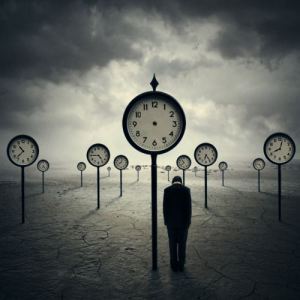
I learned that deconstruction is not something you do, it’s a way of being in the world. It started for me by deconstructing church. I realized that what we were doing wasn’t facilitating transformation and authentic community. Next, it was deconstructing my theology, which resulted with the realization that the fundamental premises of my relationship to God, myself, others and life were erroneous. This eventually led to the deconstruction of my Self, suffering, and the very nature of reality. This has continued to expand to my deconstructing many different facets of society – government, education, economics, and the miseries that plague humankind. You get to a point where you simply know too much, and it’s not an option to sit back and do nothing.


March 15, 2014
You won’t change anything without liberty, equality, and solidarity
There is a reciprocal action between ourselves and our social environment. We make society what it is and then society makes people what they are, and it becomes a kind of vicious cycle. Therefore, to transform society, people must be changed, and to transform people, society must be changed.
Therefore, we must take advantage of all the means, all the possibilities and the opportunities that the present environment allows us to raise the critical consciousness of others so that they will see how they are caught up in that vicious cycle, free themselves, and aid the liberation of others. We have the power to break this vicious cycle and transform society, we just don’t use it.
There are three non-negotiable realities we must live and demand in order to transform society. The first is liberty. Rousseau wrote, “All men are born free, but everywhere they are in chains.” If our original and true Self is one with God – free, complete, and whole – does it make sense to put the human mind, body, and personhood we were given under the control and domination of others or any system? The present reality of the kingdom of God is that freedom and wholeness, which we are to be living, expressing, and manifesting in our human reality!
Liberty is essential for the full flowering of human intelligence, creativity, and dignity. To be dominated by another is to be denied the chance to think and act for oneself, which is the only way to grow and develop one’s individuality, and experience the full potential of one’s human personhood. Domination also stifles innovation and personal responsibility, leading to conformity and mediocrity. The society that maximizes the growth of individuality will necessarily be based on voluntary association, not coercion and authority.
If liberty is essential for the fullest development of individuality, then equality is essential for genuine liberty to exist. There can be no real freedom in a class-stratified, hierarchical society riddled with gross inequalities of power, wealth, and privilege. For in such a society only a few — those at the top of the hierarchy — are relatively free, while the rest are semi-slaves. Without equality, liberty becomes a mockery — at best the “freedom” to choose one’s master (boss).
Solidarity is the third non-negotiable. Solidarity means mutual aid: working voluntarily and co-operatively with others who share the same goals and interests. Martin Luther King, Jr. said, “All mankind is tied together; all life is interrelated, and we are all caught in an inescapable network of mutuality, tied in a single garment of destiny. Whatever affects one directly, affects all indirectly. For some strange reason I can never be what I ought to be until you are what you ought to be. And you can never be what you ought to be until I am what I ought to be – this is the interrelated structure of reality.”
But without liberty and equality, society becomes a pyramid of competing classes based on the domination of the lower by the higher strata. In such a society, as we know from our own, it’s “dominate or be dominated,” “dog eat dog,” and “everyone for themselves.”
Hmm… where to start? Lately I’ve been advocating for people to start thinking for themselves. Yesterday I write two posts to consider as a practical starting point: 15 ways to start a revolution, and You own somebody. You!
I began waking up in 2005. It first involved freeing myself from the control and domination of religion, and the last few years I have been writing about my journey. This is where the journey starts for many of us. Until you unshackle yourself from your religious pathologies, there is no possibility for embracing and living the liberty, equality, and solidarity I speak of above.


March 14, 2014
You own somebody. You!
When I talk about “self-ownership,” even I sometimes have that moment of hesitation because it was drilled into me for many years that I don’t belong to myself, and that spiritual maturity involves abandoning myself to “serve God” and “do God’s will” and “submit to the lordship of Christ,” all of which meant whatever the religious “authorities/experts” told me it was. (I later became one of those “authorities/experts” telling others.) In that arrangement, the idea of self-ownership… well… self-anything for that matter… was seen as selfish and sinful.
Self-ownership is fully possessing your own life. Think of them as duties you owe to yourself, including:
the duty to be authentic and true to your unique self
the duty to be a fully-expressed human being
the duty to follow your own inner guidance and intuition
the duty to think for yourself and form your own beliefs and views
the duty to take responsibility for creating your life
the duty to take responsibility for your happiness
the duty to care for yourself and your well-being
the duty to determine and direct the path and steps of your life
the duty to invest time and energy in your interests and passions
the duty to do what brings you joy and happiness
the duty to establish loving and mutually-satisfying relationships
the duty to say no and set boundaries for your well-being
the duty to act of your own free-will and not fear, shame or coercion
the duty to terminate destructive, toxic, or oppressive relationships
the duty to be mindful and responsible in managing your own needs and desires
Did you know you own a person? It’s you. This has always been God’s intention. Spiritual maturity and transformation is NOT an abandonment of self. Spiritual maturity and transformation is NOT POSSIBLE without the foundation of self-ownership.
When you own something, you have the right to determine who has access to it. We get this idea when it comes to our car. Right? You own your car. Someone can’t just come along and decide they want it to use. This also applies to your mind, body, personality, and human personhood. You own that! While this may seem like a simple concept, it makes a big difference in how we live our lives.
If we did not own our own bodies, we could be easily abused. Without self-ownership, others could try to use our bodies, our talents or abilities, or the things we produce for their own gain without our permission. Since we own our own bodies and human personhood, however, people need our permission before they can have access to us or our talents or production or any other part of ourselves and our lives.
(Photo by Darla Winn)


15 ways to start a revolution
15 ways to start a revolution:
1. Take ownership of yourself – see your life as something you have the opportunity and responsibility to create.
2. Become an independent and freethinker – question and deconstruct the prevailing views, mentalities, and ideologies that shape and govern our lives
3. Address the root cause of your own personal suffering, captivity, disharmony, and dissatisfaction – this allows you to truly be the change you wish to see in the world.
4. Stop dividing the world up into “us” and “them” or any label – see only one human family and every person as your sister or brother, mother or father, or son or daughter.
5. Approach humankind with compassion, realizing that every person is a manifestation of their conditioning until they become conscious of it.
6. Don’t settle for being against something – be an expression of what you are for.
7. Educate yourself – understand the history and developments behind the way things are now, and realize that this will require investigating deeper than pop literature.
8. Start with what you are passionate about – identify issues, problems, needs, opportunities, injustices, etc. that touch your life on a daily level that you deeply care about.
9. Network with people who share your passion, and desire to be freethinking change agents as well.
10. Be willing to take risks.
11. Convert your good intentions into tangible actions.
12. Don’t get embroiled in the drama of defending yourself or arguing your ideas against those who disapprove or take issue with the path you are on.
13. Express yourself and your revolutionary ideas – make videos and art, speak, sing, and write blogs, books, comments, social media posters, rhymes, stories, and articles about what emerges from all of the above.
14. Expect resistance and don’t back down – exposing and confronting the systems of our world that perpetuate domination, injustice oppression, and disharmony in our world won’t be thrilled with you.
15. Realize that the above things require a commitment of time, energy, and action – involve your children and consider this a priceless part of their education.



